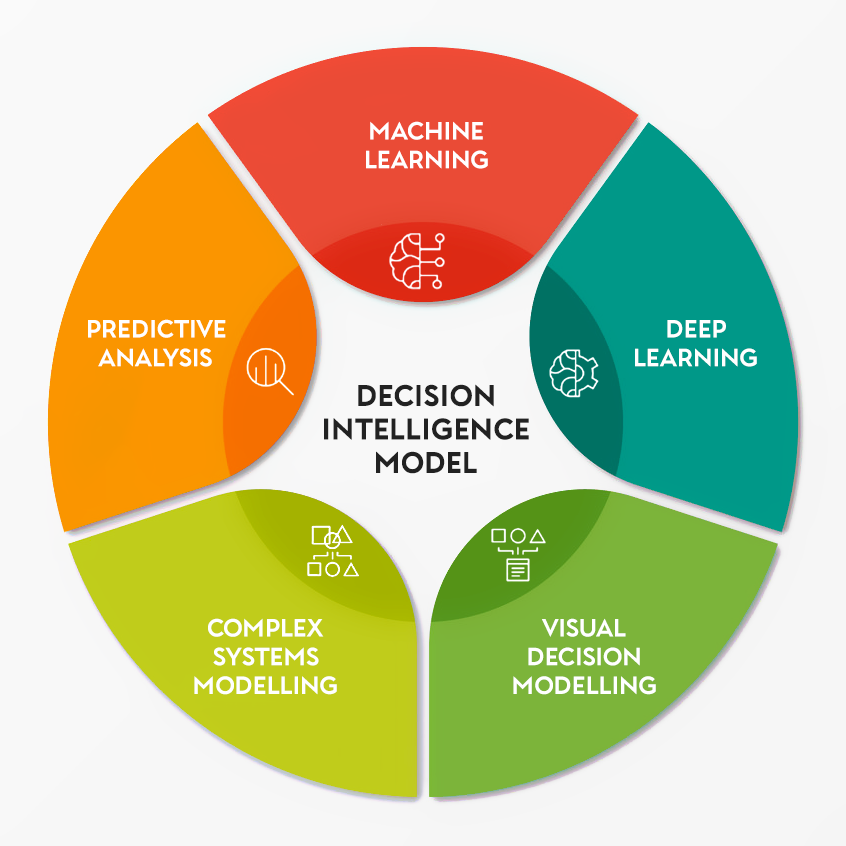Strategic & thoughtful decision-making has always been synonymous with prolific business outcomes, whether it is about a solution to eliminate particular problems or pursue potential game-changing opportunities. The need to continuously learn, evaluate, and make intelligent decisions amidst the information clutter & various influencing factors makes the art of decision-making fall next to rocket science for enterprises.
The prominence of technology has never been this high for enterprises when it comes to data-driven decision-making – with significant technology chunks such as Solid data engineering, advanced analytics platforms & intuitive business intelligence tools driving it.
What is Decision Intelligence?
Just imagine you are the Head of Mergers & Acquisition, about to decide on acquiring a venture. You are handed a tool that can analyze all vital information like sales performance, P&L data, competitor data, market insights & demand forecast on its own and provide you with the future implications of this acquisition. How helpful would it be for your strategic investment planning? That’s what decision intelligence is.
Decision intelligence is an innovative data-driven decision-support system powered by AI, ML & automation that provides actionable insights & recommendations to make faster, & accurate business decisions. How distinctive is it from existing data-driven decision systems? The answer is Contextual Intelligence, which augments human decision-making by applying real-world context to data analysis to generate meaningful and practical recommendations that drive value.
It provides a comprehensive platform for decision-makers to interact and get decision recommendations for their business scenarios. It is essential to understand here that AI systems augment decision-making models based on our perceptions and do not wholly replace people in the decision-making process.
Core Components of Decision Intelligence System
Decision Intelligence is an amalgamation of multiple technological advancements that accounts for a complete sequence of data-driven decision-making, starting from data gathering & storage to analytics that offer proactive insights.
 Key Decision Intelligence Benefits for Enterprises
Key Decision Intelligence Benefits for Enterprises
- Well-informed recommendations
- Un-biased decision making
- Improved accuracy in decision making
- Extended problem-solving capabilities
- Accelerated decision-making process
Let’s see how decision intelligence can bring impactful transformation for enterprises to improve their outcomes across some essential business functions.
Decision Intelligence Use Cases for Enterprises
Marketing & Advertising
Decision Intelligence has a broad scope over the organization’s marketing initiatives & operations. They can analyze vital variables like customer preferences, behaviour, market data & trends to achieve valuable insights and swiftly assist their go-to-market initiatives. In addition to offering personalized experiences and custom offers through targeted marketing campaigns, they can also gauge the overall effectiveness and identify potential areas for improvement.
Finance & Accounting
Businesses can make well-informed decisions by applying data intelligence to critical financial performance data and market insights, thus making the best return on their investments. Machine learning & predictive analytics are key components that can improve credit-related decision-making and enhance fraud prevention by analyzing the creditworthiness of engaged entities and identifying anomalies in financial data patterns.
Human Resources
Decision Intelligence can help build an efficient recruitment process and employee performance management system in an organization. Historical and real-time performance insights can lead to more qualitative assessments and deliver actionable insights like areas for improvement, upskilling recommendations and team allocation. At the same time, applying AI techniques and propensity modelling to the candidate data can assist in identifying the most suited candidates out of a larger pool for faster offer acceptance and talent retention.
Supply Chain & Logistics
The usage of decision intelligence in Supply Chain & Logistics is crucial for people, capacity, stock and efficiency planning. Correlating and continuously analyzing the available data can help forecast demands and impediments, prepare for contingencies, assess the risk-reward dynamics of revamping or new planning initiatives and make real-time improvements and inventory decisions faster than usual.
Manufacturing & Production
As we progress through industry 4.0, decision intelligence is poised to play a significant part in it. Organizations can develop digital twins for production facilities & simulate manufacturing operations under various conditions. This helps to gauge the performance, identify anomalies & improve the overall efficiency of manufacturing units. Besides this, decision intelligence applications can help manufacturers to make well-informed decisions in enhancing quality control by identifying potential defects; improving maintenance & support by automating performance monitoring of machinery operations.
Research & Development
Research is all about juggling between ideas & hypotheses, and decision intelligence can help deal with them more effectively. R&D teams can see foreseeable outcomes for their multitude of unique ideas & initiatives, enabling them to allocate crucial budget planning for promising projects. For a specific research project, they can simulate the various options to execute by analyzing related data variables and then filter out the ideal choice that offers better productivity & efficiency.
Decision intelligence, despite being an evolving application, is helping businesses accomplish more milestones than ever by maximizing data analytics, ML, and AI for better decision-making. It is outcome-focused and is there to support commercial decision-making. And works best where there is a need to make repeatable decisions, whether it be daily, weekly, or monthly. Ultimately, it is about making this decision-making process more efficient and reliable.
The importance of data science is based on the ability to take existing data that is not completely useful and combine it with other related data points, which can further generate insights an organization can use to learn better about its consumers. With sophisticated data science solutions, SRM Tech enables enterprises to level their decision-making capabilities across business functions.
Talk to us & discover more about how we can develop a resilient digital-ready business model for you with well-informed decisions.






